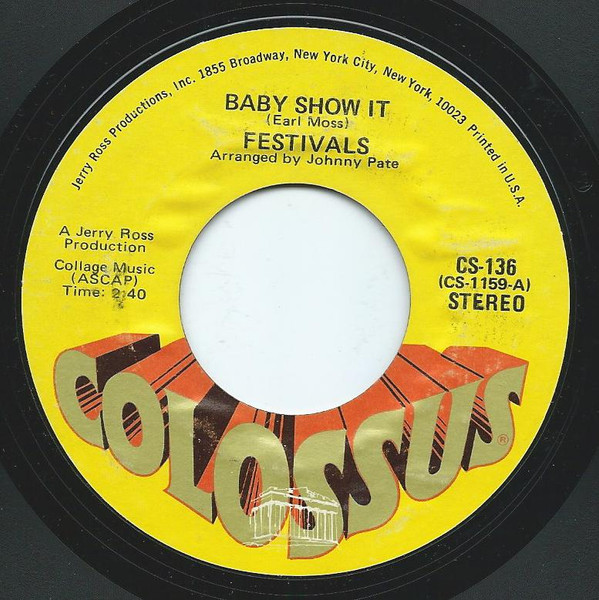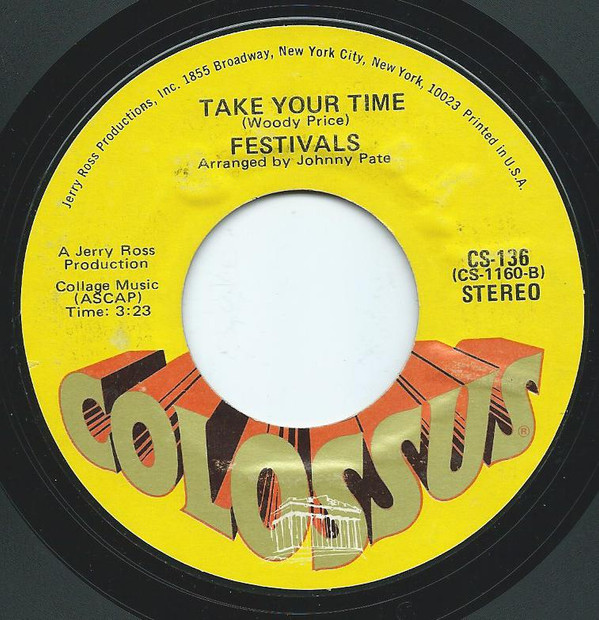MusiQ
Festivals - Baby Show It Take Your Time
Table of Contents
Download
Filename: festivals-baby-show-it-take-your-time.rar- MP3 size: 6 mb
- FLAC size: 98.6 mb
Tracks
| Track | Duration | Preview |
|---|---|---|
| Baby Show It | 2:40 | |
| Take Your Time | 3:23 |
Video
Images


Catalog Numbers
CS-136Labels
ColossusListen online
- kuunnella verkossa
- lytte på nettet
- ouvir online
- lyssna på nätet
- online luisteren
- ascolta in linea
- escuchar en línea
- écouter en ligne
- online anhören
Formats
- Vinyl
- 7"
- 45 RPM
- Single
Credits
| Role | Credit |
|---|---|
| Arranged By | Johnny Pate |
| Producer | Jerry Ross |
About Festivals
The Festivals -- Vaughn Price, Earl Moss, Woody Price, and Leon Thomas -- never got the break they needed to succeed, but not for lack of trying. They debuted on Smash Records with "I'll Always Love You" in the fall of 1966, which produced some mild rumblings in a few cities. Momentum increased in the spring of 1967 when Smash released their best-known (and best) recording "You Got the Makings of a Lover," a Moss composition that highlights the quartet's shimmering vocal blend. (Sly, Slick & Wicked from Los Angeles re-did the song in the '90s; that version inspired many to seek out the original that most never heard when it was released.)
Even those living in certain large metropolitan cities missed out since Smash only promoted the record in select cities. The sweet romancer sales' didn't bowl over Smash executives and no further promotion monies were allocated. Slow in releasing records by the Festivals, their next didn't drop until November 1968. "Hey Girl" (not the Freddie Scott song), picked up play in some localities, but nothing significant. Blue Rock Records picked up "Hey Girl" in early 1969 and reissued it with a new flip, "Checkin' Out," but sales never materialized. A stint with Philadelphia's Colossus Records equaled their releases (three) with Smash. (These are the easiest Festivals' recordings to find because of numerous compilation disks chronicling Colossus' recordings.)
But other than soul fans in the Philadelphia/Jersey area, people probably never heard "You're Gonna Make It" ( number 99 Cashbox), "Baby Show It," or "Give Her Up," all issued from 1970 to 1971. Motown issued their version of "Green Grow the Lilacs" in the summer of 1972 on Gordy Records; the same song they originally issued on the Originals in 1969. Motown never issued anything else by them, but some unreleased hummers may be dusting in a vault awaiting discovery. A final record on Lo Lo was the last-known recording by the members as the Festivals. Leon Thomas and Earl Moss performed backing vocals on Doc Severinsen's Night Journey LP (1975), but radar hasn't detected anything else by the group as a whole, or its members as individuals.
Name Vars
- Festivals
Members
- Earl Moss
These brothers could sing, sing, Sang! Thank you for posting.